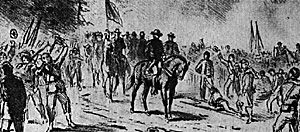
No matter how much your army commander zooms around the map, popping in unexpectedly at 1st Corps to rattle off a major order, and then hustling down the road to visit 6th Corps, he never gets lost. He always manages to find those corps commanders, no matter how many times they have shifted location.
Of course, this is at odds with fact. In a CWB game, a good army commander issues as many In-Person Verbal orders as possible, since this method provides a major positive shift on the Acceptance Table. To sit down in one location and issue a stream of aidedelivered instructions invites needless delay. Historically, however, most army commanders indeed did just that. What face-to-face supervision occurred was more often a subordinate summoned to the commander's presence for particularly detailed instructions. Ordinarily, it took a crisis to send the general-in-charge scurrying personally to the local scene to set matters right.
With the publication of the CWB 2nd Edition, we resolved many of the minor conflicts inherent in the command system. Some concepts were too complicated and did not make the final cut. An acceptance penalty on generals who move around too much was one of these, because it is too messy to track in exchange for the historical payoff. However, there is always room for a variant in Operations. The thrust of this article is exactly that: penalizing those footloose generals.
Historically, the main reason officers did not do the twostep all over a battlefield was confusion. For instance, each time a corps commander shifted location, he had to tell the army commander the new site of his HQ. Add a constantly shifting Army HQ, and soon, two aides, one from each HQ, were looking for the other command post in the old location. It is not a great leap to see this as a recipe for complete chaos. Even the best subordinate is useless if you cannot find him on the battlefield.
You can find a good example of this mess at Chickamauga, after the first day's battle. Bragg ordered Polk to attack at dawn. Polk was unable to find his subordinate. Therefore, Hill never received the message. That night, he came looking for Polk for his orders, but missed the Wing Commander's HQ in the dark. The net result was no dawn attack, and a furious round of recriminations among all three generals after the battle.
Any system involving reciprocating sets of aides bouncing back and forth between HQs would choke to death on the detail. Instead, we need to abstract this process into a standard delay factor that makes sending written, aide-delivered orders as likely an option as going there in person.
HQs
To introduce leader movement penalties into the CWB command system, first we must look at the HQ units themselves. I propose the following rules.
- 1. An Army HQ must always stay stacked with the Army Commander.
2. The army HQ has two sides, stationary and moving. The HQ side face up represents a stationary HQ; an inverted HQ is moving.
3. You may only place HQs on their stationary side at the beginning of a friendly movement phase, before they have expended any movement. You may only flip moving HQs after successfully rolling a 1-4 on one die.
4. Any time a stationary HQ moves, flip it to its moving side. No die roll is necessary to convert an HQ from stationary to moving.
5. In any order situation where the army HQ is on its moving (inverted) side, apply an additional -2 to the order acceptance number. This effect occurs only at the instant the order is written; make note of it then. If the HQ becomes stationary subsequent to the order's inception but before the time the order reaches its recipient, the -2 penalty still applies. Conversely, if the HQ was stationary at the instant of creation, but later moves, the penalty does not automatically apply to all extant unreceived orders.
6. The penalty applies in all cases resolving an in-person order, including instances where both sender and receiver are in the same hex.
Ideally, this will impose a minimum of a turn's extra delay into the order system when the commander is off roaming. Even if he moved last turn, and starts his command phase stacked with the intended recipient, the army commander will still have to wait a complete turn to avoid the extra -2 penalty. More significant, an unsuccessful die roll can further disrupt the process. On the whole, I think this will create an atmosphere conducive to keeping the CO down on the farm, rather than playing tourist all over the field.
Back to Table of Contents -- Operations #15
Back to Operations List of Issues
Back to MagWeb Master List of Magazines
© Copyright 1994 by The Gamers.
This article appears in MagWeb (Magazine Web) on the Internet World Wide Web.
Other military history articles and gaming articles are available at http://www.magweb.com